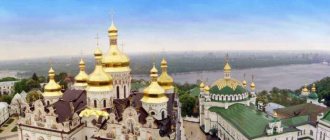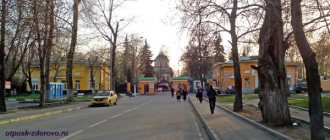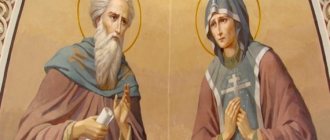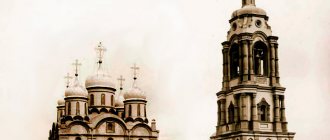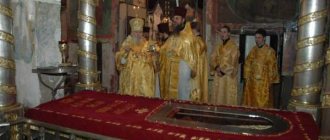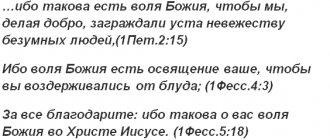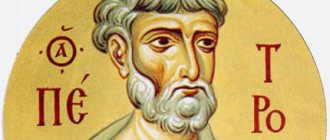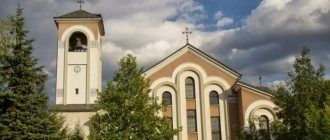The beginning of life's journey
The life of the Monk Onuphry is known from the memoirs of Elder Paphnutius, who witnessed the last days of the saint and heard the story of the monk’s hermitage first-hand.
Venerable Onuphrius the Great
Childhood and adolescence
According to legend, in 320, a long-awaited son was born into the family of the king of Persia, who was begged from God as a result of many hours of parental prayers. Evil souls brought gossip into the king’s ears that the child was conceived by a servant. Angry, the father threw his son into the fire, but the flames literally scattered around the tiny body.
The Lord commanded that the boy be named Onuphrius and transferred immediately after birth to the Egyptian monastery of Eriti. The Creator arranged it so that a baby who refused mother's milk received food in the form of milk from a doe, which was with him until he was 3 years old. The beautiful community of the Thebaid desert raised the boy in the fear of the Lord and love for His commandments.
Interesting! According to legend, the sacristan tried to feed the child by giving a piece of bread, but the boy never ate himself; he ran to the holy image of the Mother of God with the Child. On one of these days, the sacristan witnessed how a boy approached the icon with the words that he wanted to share bread with the Baby, because Tom was not given a single piece.
Jesus reached out his hands and took the grain offering. The surprised sacristan ran to the abbot and told him about what he had seen. The abbot ordered the next day not to give the boy bread, but suggested that he ask for food from the Child on the icon.
The naive child did not feel the trick; with a pure heart he knelt before the holy image and asked Jesus for some bread, and at that very moment a huge loaf of bread was in his hands. The young monk barely brought the bread to the abbot, after which all the brethren gave glory to God, admiring the grace that lay upon Onuphriya.
The young man heard more than once about hermits living like John the Baptist in solitude, striving to receive God's bliss in the future, and not human consolation. The desire to perform a hermit’s feat was kindled in the heart of the young monk, and he secretly left the monastery.
Prayer feat in Akeldam
The tradition of life in Akeldam is kept only by the Jerusalem Orthodox Church. It says that after leaving the monastery of Eriti, Onuphrius visited Jerusalem, and for several years begged not only Akeldama itself, but also all those buried in it.
Grateful descendants did not forget the saint’s feat of prayer and built the Onufrievsky Monastery in Greece. It was the saint’s prayers for the buried that laid the foundation for the Orthodox tradition of consecrating churches in cemeteries in the name of St. Onuphrius the Great.
Meeting with Elder Ermiy
After leaving Jerusalem, the monk wandered through the desert until, exhausted, he fell. At this time, a bright light appeared above him, emitted by a guardian angel, who promised not to leave Onuphrius until his death. Guided by an angel, the traveler came to the cave of Elder Hermias; he led a hermit’s life for many years.
Icon of St. Onuphrius the Great
For several days, day and night, the old hermit taught the young monk life in the desert, then took him to a remote place and left him alone with nature. In subsequent years, the elder visited the hermit until death took him.
Orthodox prayer - Orthodox book
What do they pray to St. Onuphrius the Great for?
Onuphrius the Great, who lived in the 4th century, became famous as an Egyptian hermit, one of the most strict ascetics. The saint lived in complete solitude in a den (cave), leading an ascetic life, enduring the heat of the day and the cold of the night, and other difficulties, suffering and deprivation. So 60 years passed. Onuphry grew long hair that replaced his clothes; his beard touched the ground. According to legend, an Angel with the Holy Gifts appeared to Onuphrius and gave him communion. Shortly before Onuphry's death, Elder Paphnutius visited him, to whom the monk told about his life. Having blessed Paphnutius, the hermit began to pray, during which he died (c. 400). The Monk Onuphrius the Great is especially revered as a protector from sudden (sudden) death. They also pray to him for the consolation of the mourning, the healing of the sick, for help to all those who work and are exhausted, as well as for those who struggle with sinful passions and motives, for protection from visible and invisible enemies and all evil. The great ascetic is also asked for strengthening in the Orthodox faith, for help in saving the soul, admonishing and enlightening all who suffer from lack of faith or lack of faith.
Prayer to St. Onuphrius the Great
O most wonderful and blessed servant of Christ and our Abvo, Onuphrie the Great! You have shown wondrous love for your Lord, and you have been strengthened for wondrous deeds by His grace, and for this, for the sake of great boldness towards Him, you have been vouchsafed: many miracles and signs of the power of God have appeared to people about you. Look, then, even now, dear Father, with the merciful eye of your love on us unworthy servants, and grant to everyone according to their every need, according to faith and hope: gladden those who mourn, comfort those who cry, heal those who are sick, help those who are toiling, strengthen those who struggle with passions and attacks of the enemy, and bless, support the exhausted, your monastery and all of us from visible enemies and save from all evil. Magnify the holy Orthodox faith in our Fatherland, convert the erring, bring to reason those who have fallen away, strengthen the wavering, soften the stubborn, enlighten the unfaithful, and bring everyone to the quiet refuge of the Heavenly Fatherland. O wonderful word of consolation to the monastics and all the faithful! Enlighten us with your glorious deeds and the sweet vision of your miraculous image and strengthen us for every deed, labor and patience for the glory of the Name of God, so that we may be worthy of salvation with you and all the saints of the Eternal and Most Blessed Kingdom of glory of the Father and the Son and the Holy Spirit forever and ever. Amen.
© Mikhail Tikhomirov Quoted in abbreviation from the book: PRAYERS TO THE SAINTS OF GOD WITH BRIEF INFORMATION ABOUT LIVES AND HELP FOR DIFFERENT NEEDS. – M.: Publishing house. Tikhomirova M.Yu., 2022. Orthodox book by mail pravmolitva.ru
Hermit life
Carnal infirmities, demons, and the vagaries of nature overcame Saint Onuphrius the Great, whose life was spent alone, far from people.
The Lord did not leave Onuphrius, helping during:
- heat;
- night and winter cold;
- diseases;
- carnal weakness;
- hunger.
The hermit spent 60 long years far from people, but close to God, who granted protection and food. As time passed, the hermit’s clothes simply fell into pieces, but the Creator covered the old man’s body with thick hair.
Important! The Guardian Angel brought bread cakes daily, and on Sundays God's messenger gave the saint special consolation, bringing communion, strengthening the hermit's strength to continue the feat of solitude. At that moment, when Onuphrius was overcome with longing for people, the Angel showed him pictures of paradise and the life of the saints in it.
After 30 years of trials, the Lord gave the hermit an amazing palm tree with 12 branches, each of them bore fruit in a certain month, so that the hermit received sweet fruits for a whole year. One day, a spring of living water began to flow near the cave.
LiveInternetLiveInternet
Thursday, June 25, 2015 11:23 + to quote book
Venerable Onuphrius the Great, Prince of Persia, Prince of Persia (June 12, Old Style) Saint Onuphrius the Great, Prince of Persia, was born around 320 in the family of the Persian king. His father, having no offspring for a long time, prayed with all his soul to the Lord to give him a son, and God heard him. But even before the birth of Saint Onuphrius, one day a demon came to his father under the guise of a wanderer and said: “King, your wife will give birth to a son, but not from you, but from one of your servants. If you want to make sure that I am telling the truth, order the newborn to be thrown into the fire, and if I tell a lie, then God will keep him unharmed.” The father did not understand the cunning of the enemy and, believing the imaginary wanderer, carried out the evil advice, throwing the newborn child into the fire. A miracle happened: the child stretched out his hands to the sky, as if praying to the Creator for salvation, and the flame, dividing into two sides, left the baby unharmed. Meanwhile, an angel of God appeared to the father and, exposing him in his reckless trust in the devil’s slander, ordered him to baptize his Son, name him Onuphrius and take him where God would indicate. When they noticed that the child did not accept mother’s milk at all, the father hastily set off on the journey with his son, fearing that the baby would die of hunger. In the desert, a white doe ran up to them and, having fed the baby with her milk, ran forward, as if showing them the way. So they reached the monastery, near the city of Hermopolis. The hegumen, informed about this from above, met them and took Saint Onuphrius to his upbringing. Having said goodbye to his son, the king left and did not stop visiting the monastery until his death. The doe fed Saint Onuphrius until he was three years old. When the boy turned 7 years old, a miracle happened to him. The monastery's cleric gave him a portion of the bread every day. Saint Onuphrius, visiting the temple, approached the icon of the Most Holy Theotokos with the Eternal Infant of God in his arms, and in his angelic simplicity addressed the Infant of God Jesus with the words: “You are the same Infant as I am; but the sacristan does not give you bread, so take my bread and eat.” The Baby Jesus stretched out His hands and took bread from Saint Onuphrius... One day the sacristan noticed this miracle and reported everything to the abbot. The abbot ordered the next day not to give Saint Onuphrius bread, but to send him to Jesus for bread. Saint Onuphrius, obeying the words of the keymaster, went to the temple, knelt down and, turning to the Divine Infant on the icon, said: “The keykeeper did not give me bread, but sent me to You to receive it; give me at least a piece, for I am very hungry.” The Lord gave him wonderful and wonderful bread, so large that Saint Onuphrius barely took it to the abbot. The abbot, together with the brethren, glorified God, marveling at the grace that rested on Saint Onuphrius. At the age of ten, Saint Onuphrius went into the desert, wanting to imitate the holy prophets Elijah and John the Baptist. When he secretly left the monastery at night, a ray of light appeared before him, showing him the way to the place of his desert exploits. Here Saint Onuphrius found a wondrous desert elder, with whom he lived for some time, learning from him the rules of desert living. A few years later the elder died, and Saint Onuphrius lived for sixty years in complete solitude. He endured many sorrows and temptations during this time. When his clothes were worn out and he was suffering greatly from heat and cold, the Lord clothed him with a thick covering of hair on his head, beard and body. For thirty years an angel of God brought him bread and water daily, and for the last 30 years he ate from a date palm tree that, by the grace of God, grew near his cave, which had 12 branches that alternately bore fruit monthly. He now drank water from a spring that had miraculously opened near the cave. During all 60 years, an angel of God came to the Monk Onuphrius on holidays and communed him with the Holy Mysteries of Christ. The narrator of the lives of many desert dwellers, the Monk Paphnutius, reports that when, guided by Divine providence, he came to the cave where the Monk Onuphrius lived, he was greatly frightened when he saw the monk, overgrown with white wavy hair. The Monk Paphnutius wanted to run, but the Monk Onuphry stopped him with the words: “Man of God, do not be afraid of me, for I am a sinful person like you.” This calmed the Monk Paphnutius, and a long conversation took place between the ascetics. The Monk Onuphry told about himself, how he came to this place and how many years he lived here. During the conversation, suddenly, no one knows who, bread and a vessel with water were placed in the middle of the cave. The ascetics, having refreshed themselves with food, talked and prayed to God for a long time. The next day, the Monk Paphnutius noticed that the face of the Monk Onuphrius had changed greatly. The Monk Onuphrny said: “God sent you, Paphnutius, for my burial, for today I will complete my service to God in this world.” The Monk Paphnutius began to ask the Monk Onuphrius to be allowed to stay and live in this place in the desert, but the Monk Onuphrius did not allow him, saying: “God chose you so that, having visited many hermits, you would tell the monks and all Christians about their lives and deeds, therefore return to your brethren and tell them that the Lord has heard my prayers, and that everyone who honors my memory in any way will be worthy of God’s blessing; The Lord will help him with His grace in all good endeavors on earth, and in Heaven he will accept him into holy villages.” Having said many more edifying words, the Monk Onuphrius prayed to God, lay down on the ground and, folding his hands crosswise on his chest, reposed before the Lord. His face shone like the sun, and the cave was filled with fragrance; angelic singing and a wondrous Divine voice were heard: “Leave your mortal body, My beloved soul, so that I may take you to a place of eternal rest with all My chosen ones.” The Monk Paphnutius buried the honorable body of the great ascetic and returned to his monastery, glorifying the Lord. Akathist HERE: https://pokrov.skynet.net.ua/modules/cd3/zitie/onufrii_velikii.htm Prayer for the Reverend Father Onuphrie! We pray to you: hear us, sinners and unworthy servants of God (names), at this hour. And accept this little prayer of ours: blot out the handwriting of our nasty and unclean deeds with your prayer, always cover us with your intercession and bring us to the bright palace prepared for the faithful with your prayers; pray to the Merciful God, may He forgive us all our sins, voluntary and involuntary, and all the evil deeds we have done, and may He deliver us through your intercession from eternal torment and grant us the joy of eternal enjoyment, together with all the saints, forever and ever. Troparion to the Venerable Onuphrius the Great You reached the spiritual desert with a spiritual desire, O god-wise Onuphrius, and as if you were disembodied in it for many years, you laboriously labored, competing with the prophets Elijah and the Baptist: and having enjoyed the divine mysteries from the hand of the angels, now in the light of the Holy Trinity you rejoice with them. Pray for us, who honor your memory, to be saved. Martin Ryckaert, 1587-1633. . Flanders - Pa... Holy Hermit Onuphrius the Great
Temple of St. Onuphrius the Great
Anapa, st.
Sobornaya, 7 The Church of St. Onuphrius the Great is considered one of the most ancient in all of Kuban. It was built by order of Nicholas I at the end of the 19th century. He considered this particular saint to be the patron saint of the city, and that it was thanks to him that it was possible to achieve the complete surrender of the Turkish army in the 20s of the 19th century. Having announced the beginning of the Russian-Turkish war, the emperor managed not only to reopen the Bosporus Strait, but also to recapture Anapa and make it part of Russia. In the 30s of the 20th century, like most churches, the temple was looted, partially destroying both the facade and the interior. At that time, there was a local history museum in its camp. But, by a strange coincidence, during the Great Patriotic War, the townspeople were allowed to restore the temple and hold services at their own expense. In 1964, the once majestic temple turned into a home for pioneers. A large stage was built on the spot where the sacred altar stood. The building was returned only in 1991, and now the Church of St. Onuphrius the Great receives parishioners to this day. A few years ago, its facade was restored again, and its interior decoration is simply amazing. Tags:
Venerable Onuphrius the Great
Cited 3 times Liked by: 4 users
Like share
0
Like
- 4
I liked the post - Quoted
- 0
Saved
- Add to quote book
- 0
Save to links
Liked4
0
Meeting with Paphnutius and peaceful departure
Elder Paphnutius was granted a meeting with the saint on the eve of his departure into eternal bliss.
While in the desert for several days, Paphnutius met an unusual-looking man with gray hair and a knee-length beard, who covered him in the form of a cape. The wanderer greeted the tired traveler favorably and invited him into the cave for a long conversation.
Holy Venerable Onuphrius the Great
Tired after wandering in the desert, Paphnutius did not dare to ask for food, when bread and a jug of water appeared from nowhere. Having satisfied their hunger, the ascetics spent day and night in conversation.
The next morning the elder told Paphnutius that he had been sent by the Lord to bury the Monk Onuphrius the Great. Hearing about the guest’s desire to repeat the hermit’s feat, the monk conveyed a message from the Lord, which said that Paphnutius should return to the monastery and tell the monks about the life of the holy hermits.
When the last instructions were given, the hermit lay down on the earthen floor, folded his arms crosswise on his chest, and quietly rested. As soon as the soul left the body, the face of the saint shone with an amazing light, and a pleasant smell of fragrances spread throughout the cave.
Interesting! Paphnutius heard angelic singing and a voice saying that the soul of the deceased was taken into eternal bliss. Paphnutius's body, wrapped in a hair shirt, was buried under a pile of stones, which served as protection from attacks by predators.
As soon as Paphnutius decided to settle in the cave for a while, it instantly collapsed. The palm tree dried up and sank with its roots underground before the eyes of the astonished monk; moreover, there was not a drop of water left in the source.
Thus, the Creator let Paphnutius know that he did not want to see him as an ascetic and ordered him to return to Egypt and tell about everything that happened to him in the desert. The monks in the monastery, having heard the story of the returning monk, compiled a description of the life of St. Onuphrius the Great and contributed to its dissemination among Christians in Egypt and the East.
Venerables Onuphrius the Great and Peter of Athos, hermits
On June 25, the memory of two great ascetics is celebrated, who lived at different times, but were united by a common feat - hermitage.
Venerable Onuphrius the Great
- Egyptian ascetic who lived in the 4th century. The life of the saint is known from the words of a monk of one of the Thebaid monasteries, the Monk Paphnutius, who met him in the desert before his death and buried him. By the time of his meeting with Paphnutius, Onuphrius had lived in the desert completely alone for 60 years.
Some versions of the life report that Onuphrius the Great was born around 320 in Persia and was the son of the Persian king, who, at the inspiration of an angel, sent him in infancy to a monastery. He received his education in the Thebaid monastery of Eriti near Hermipolis, where he learned from the elders about the hermits and wanted to imitate them. He secretly left the monastery and came to the Thebaid desert (Egypt) where he met a hermit who became his teacher. For several years the elder taught Onuphrius how to fight the temptations of the devil, and then, convinced of the strength of his student’s spirit, he left him alone. Every year the teacher came to Onuphry and died during one of his visits.
Prpp. Peter of Athos and Onuphry. Icon. Monastery of Dionysiat on Mount Athos. Before 1577
At the request of the Monk Paphnutius, the Monk Onuphrius spoke about his exploits and labors and how the Lord consoled him: near the cave where he lived, a date palm tree grew and a source of clean water opened. Twelve branches of the palm tree bore fruit in turn, and the monk did not tolerate hunger and thirst. The shade of a palm tree sheltered him from the midday heat. An angel brought bread to the saint and every Saturday and Sunday he communed him, like other hermits, with the Holy Mysteries.
The monks talked until the evening. In the evening, white bread appeared among the elders, and they ate it with water. The elders spent the night in prayer. After the morning singing, the Monk Paphnutius saw that the face of the Monk Onuphry had changed, and was afraid for him. Saint Onuphrius said: “God, Merciful to all, sent you to me so that you would bury my body. Today I will end my temporary life and depart to endless life, in eternal peace to my Christ.” The Monk Onuphry bequeathed to Saint Paphnutius that he should tell all his brother ascetics and all Christians about him for the sake of their salvation.
The Monk Paphnutius asked for blessings to remain in the desert, but Saint Onuphrius said that this was not the will of God, and ordered him to return to the monastery and tell everyone about the life of the Thebaid hermits. Having blessed the Monk Paphnutius and bidding farewell to him, Saint Onuphrius prayed for a long time with tears, then lay down on the ground, uttered his last words: “Into Thy hands, my God, I commend my spirit,” and died.
The Monk Paphnutius, weeping, tore the lining from his clothes and wrapped the body of the great hermit in it, which he placed in the recess of a large stone, like a coffin, and covered it with many small stones. Then he began to pray that the Lord would allow him to remain in the place of the exploits of the Monk Onuphrius until the end of his life. Suddenly the cave collapsed, the palm tree withered, and the spring dried up. Realizing that he had no blessing to stay, the Monk Paphnutius returned to his monastery. The brethren recorded in detail the story of the monk about the life and exploits of Elder Onuphrius and distributed it to other monasteries and monasteries.
Troparion of St. Onuphrius the Great
AND
By spiritual desire you reached the desert, God-wise Onuphrie, / and as if you were disembodied in it for many years, you labored more diligently, / competing with the prophets Elijah and the Baptist: / and having enjoyed the divine mysteries from the hand of the angels, / now in the light of the Holy Trinity, having fun with them. / Pray to be saved to us who honor your memory.
Kontakion St. Onuphrius the Great, voice 3
WITH
by the radiance of the Most Holy Spirit,/ having been enlightened by the God-Wise,/ you have abandoned rumors in your life,/ but you have reached the desert, O Reverend Father,/ you have made God and Creator glad over all,/ for this reason Christ, blessed One, glorifies you// the great Giver.
Venerable Peter of Athos
- is the founder of monasticism on Holy Mount Athos. He was a Greek by birth, served as a commander in the imperial troops and lived in Constantinople. In 667, during the war with the Syrians, he was captured and imprisoned in the fortress of Samara on the Euphrates River.
For a long time he languished in prison and thought about what sins he had been punished by God for. Saint Peter remembered that he once had the intention of leaving the world and entering a monastery, but he never fulfilled it. He began to observe strict fasting in prison and pray fervently. Saint Nicholas the Wonderworker appeared to him twice. For the third time - and together with the righteous Simeon the God-Receiver. Saint Simeon touched the chains of Saint Peter with his rod, and the iron melted like wax. The doors of the prison opened, and Saint Peter came out to freedom. The Holy Receiver of God became invisible, and Saint Nicholas escorted Saint Peter to the border of the Greek land. To receive the monastic image at the tomb of the Apostle Peter, Saint Peter went to Rome.
St. Peter Afonsky. Fresco. Temple of Protaton (Protat) on Mount Athos. Con. XIII century
During the service, the Bishop of Rome said loudly: “Peter, who came from the Greek land, whom St. Nicholas freed from prison in Samara, come to me.” The bishop tonsured him into an angelic image at the tomb of the Apostle Peter and taught him the rules of monastic life. Then, with blessing, he released me to wherever God would deign to direct me. The monk boarded a ship sailing east. The Mother of God appeared to the holy monk in a dream and indicated the place where he should live until the end of his days. When the ship sailed past Athos, it stopped by itself. The monk went ashore and spent 53 years in the deserted places of the Holy Mountain. His clothes decayed, and his hair and beard grew and covered his body instead of clothes.
The hermit was repeatedly subjected to demonic attacks and temptations. The Mother of God appeared to the saint in a dream along with Saint Nicholas and said that every 40 days an angel would bring him heavenly manna. From that time on, the monk fasted for 40 days and on the fortieth day was refreshed with heavenly manna.
One day, a hunter, chasing a deer, saw a naked man, overgrown with hair and girded with leaves around his loins, became frightened and began to run. The anchorite stopped him and told him about his life. A year later, the hunter returned with his brother, possessed by a demon, and other companions. Entering the cave, they saw that the saint had already reposed before God. The hunter, with bitter tears, told his companions about the life of the hermit, and his brother, touching the body of the saint of God, received healing.
The Monk Peter died in 734. His holy relics were located on Mount Athos in the monastery of St. Clement. During the iconoclasm they were hidden, and in 969 they were transferred to the Thracian village of Photoki. Some of the relics are kept in the Holy Intercession Cathedral of the Russian Panteleimon Monastery on Mount Athos.
The name of the Monk Peter of Athos is associated with the sacred covenant of the Most Holy Theotokos about her earthly destiny - Holy Mount Athos, which remains in force to this day: “In Mount Athos there will be his rest, that is, My lot from My Son and God, given to Me, but separated worldly rumors and the spiritual strength of their deeds, calling on My name with faith and love from the soul, they spend their temporary life there without sorrow, and those who are pleasing to God for the sake of their deeds will receive eternal life: for I love that place dearly and I want to increase the monastic rank there, and the mercy of My Son and God to those who have monasticism there will not be ruined forever, if they also keep the saving commandments; and I will spread them in the Mountain to the south and north, and they will prevail from world to world, and I will make their name praiseworthy in all the sunflowers and protect those who will patiently strive there in fasting.”
Troparion of St. Peter of Athos, tone 4
M
you forsook the Lord for your sake, Peter, / and took the cross upon your frame, / you reached Mount Athos, / like Elijah the Tishbite of old. / And you remained in it with fasting, and prayers, and vigil, / Making God merciful, / and Offering the Most Pure Mother of God the Prayer Book, / for this sake we cry out to you: / pray to Christ God that he may save our souls.
Kontakion St. Peter of Athos , voice 2
U
having given yourself human cohabitation,/ you lived in stone caves and crevices,/ through the Divine desire and love of Peter, your Lord,/ you received a crown from the Worthless One.// Pray unceasingly for us to be saved.
June 25, 2022 Share
Memorial Day: June 12
The life of St. Onuphrius the Great and other hermits of the 4th century who labored in the inner Thebaid desert in Egypt (including St. Timothy the Hermit, St. John, Andrew, Iraklemon (Heraklavmon), Theophilus and others) was written by their contemporary, a monk of one of the Thebaid monasteries, St. Paphnutius . One day the idea came to him to go into the depths of the desert to see for himself the fathers who labored there and hear from them how they were saved. He left the monastery and went deeper into the desert. Four days later the monk reached the cave and found in it the body of a long-dead old man. Having buried the hermit, the Monk Paphnutius moved on. After the next four days, he came across another cave and learned from footprints in the sand that someone lived in it. At sunset he saw a herd of buffaloes and a man walking among them. He was naked, but covered, like clothing, with long hair. This was the Monk Timothy the Hermit. Seeing the man, the Monk Timothy thought that it was a ghost and began to pray. Saint Paphnutius assured the hermit that he was a living Christian man. The Monk Timothy showed him hospitality and told him that he had been asceticizing in the desert for 30 years and for the first time in that time he had seen a person. In his youth, the Monk Timothy lived in a communal monastery, but he was confused by the thought of saving himself alone. The Monk Timothy left the monastery and lived near the city, eating from the labor of his hands (he was a weaver). One day a woman came to him with an order and he fell into sin with her. Having come to his senses, the sinful monk went far into the desert, where he patiently endured sorrows and illnesses as a well-deserved punishment from God. When he was about to die of hunger, he miraculously received healing. From then on, the Monk Timothy lived peacefully in complete solitude, eating the fruits of the date palm, quenching his thirst with water from the spring. The Monk Paphnutius asked the elder to allow him to remain in the desert. But he replied that he could not bear the demonic temptations to which the desert dwellers were exposed, blessed him and provided him with dates and water for the road. After resting in a desert monastery, the Monk Paphnutius undertook a second journey into the depths of the desert. He walked for 17 days. The supply of bread and water ran out, and the Monk Paphnutius fell twice from exhaustion. An Angel supported him. On the 17th day, the Monk Paphnutius reached the mountain and sat down to rest. Here he saw a man approaching him, covered from head to toe with white hair and girded with leaves along his thighs. The sight of the elder frightened Saint Paphnutius; he jumped up and ran up the mountain. The old man sat down at the foot of the mountain. When, raising his head, he saw the Monk Paphnutius, he called him to him. This was the great hermit - St. Onuphrius. At the request of Saint Paphnutius, he spoke about himself. The Monk Onufry lived completely alone in the wild desert for 60 years. In his youth he was brought up in the Thebaid monastery of Eriti. Having learned from the elders about the great difficulty and height of life of the desert people, to whom the Lord sends His help through the Angels, the Monk Onuphrius was kindled in spirit to imitate their exploits. At night, he secretly left the monastery and saw a bright ray in front of him. Saint Onuphrius was frightened and decided to return, but the voice of the Guardian Angel prompted him to take a further path. In the depths of the desert, the Monk Onuphrius found a hermit and stayed to learn from him desert life and the fight against devilish temptations. When the elder became convinced that Saint Onuphrius had strengthened himself in this terrible struggle, he brought him to the place indicated for his labors and left him alone. Every year the elder came to him and a few years later, having come to the Monk Onuphrius, he died. At the request of the Monk Paphnutius, the Monk Onuphrius spoke about his exploits and labors and how the Lord consoled him: near the cave where he lived, a date palm tree grew and a source of clean water opened. Twelve branches of the palm tree bore fruit in turn, and the monk did not tolerate hunger and thirst. The shade of a palm tree sheltered him from the midday heat. An angel brought bread to the saint and every Saturday and Sunday he communed him, like other hermits, with the Holy Mysteries. The monks talked until the evening. In the evening, white bread appeared among the elders, and they ate it with water. The elders spent the night in prayer. After the morning singing, the Monk Paphnutius saw that the face of the Monk Onuphry had changed, and was afraid for him. Saint Onuphrius said: “God, Merciful to all, sent you to me so that you would bury my body. Today I will end my temporary life and depart to endless life, in eternal peace to my Christ.” The Monk Onuphry bequeathed to Saint Paphnutius that he should tell all his brother ascetics and all Christians about him for the sake of their salvation. The Monk Paphnutius asked for blessings to remain in the desert, but Saint Onuphrius said that this was not the will of God, and ordered him to return to the monastery and tell everyone about the life of the Thebaid hermits. Having blessed the Monk Paphnutius and bidding farewell to him, Saint Onuphrius prayed for a long time with tears, then lay down on the ground, uttered his last words: “Into Thy hands, my God, I commend my spirit,” and died. The Monk Paphnutius, weeping, tore the lining from his clothes and wrapped the body of the great hermit in it, which he placed in the recess of a large stone, like a coffin, and covered it with many small stones. Then he began to pray that the Lord would allow him to remain in the place of the exploits of the Monk Onuphrius until the end of his life. Suddenly the cave collapsed, the palm tree withered, and the spring dried up. Realizing that he had no blessing to stay, the Monk Paphnutius set off on the return journey. After 4 days, the Monk Paphnutius reached the cave, where he was met by a hermit who had been in the desert for more than 60 years. Apart from the two other elders with whom he labored together, this hermit saw no one. The ascetics spent the entire week alone in the desert, and on Saturday and Sunday they came together to sing psalms. They ate bread that the Angel brought. Since it was Saturday, the hermits gathered together. Having eaten the bread they received from the Angel, they spent the whole night in prayer. When leaving, the Monk Paphnutius asked the names of the elders, but they said: “God, who knows everything, also knows our names. Remember us, so that we may be worthy to see each other in the Mountain Villages of God.” Continuing his journey, the Monk Paphnutius came across an oasis that struck him with its beauty and abundance of fruit-bearing trees. Four young men who lived here came out to him from the desert. The young men told the Monk Paphnutius that in childhood they lived in the city of Oxynrich (Upper Thebaid) and learned to read and write together. They were eager to devote their lives to God. Having agreed to go into the desert, the young men left the city and after several days of travel reached the desert. They were met by a man shining with light and led to the hermit elder. “For six years now,” the young men said, “we have been living in this place. Our elder lived here for one year and died. We live alone now, we eat the fruits of the trees, and our water comes from a spring.” The boys said their names. These were Saints John, Andrew, Iraklamvon (Heraklemon) and Theophilus. All week long, the young hermits labored separately from each other, and on Saturday and Sunday they gathered in an oasis and offered a common prayer. On these days, an Angel appeared and communed them with the Holy Mysteries. For the sake of the Monk Paphnutius, they did not go into the desert, but prayed together all week. The following Saturday and Sunday, Saint Paphnutius, together with the young men, was honored to receive communion from the hands of the Angel of the Holy Mysteries and hear the words spoken by the Angel: “May the Body and Blood of the Lord Jesus Christ, our God, be for you Incorruptible Food, Endless Joy and Eternal Life.” The Monk Paphnutius dared to ask the Angel for permission to remain in the desert until the end of his days. The angel replied that God showed him a different path - to return to Egypt and tell all Christians about the life of the desert people. Having said goodbye to the young men, the Monk Paphnutius, after three days of travel, went to the edge of the desert. There was a small monastery here. The brothers greeted him with love. The Monk Paphnutius told everything that he had learned about the holy fathers he met in the depths of the desert. The brethren recorded in detail the story of the Monk Paphnutius and distributed it to other monasteries and monasteries. The Monk Paphnutius thanked God, who had vouchsafed him to learn about the high life of the hermits of the Thebaid desert, and returned to his monastery.
Church of the Life-Giving Trinity, Saransk
“...everyone who honors my memory, in any way, will receive God’s blessing. The Lord will help him with His grace in all good endeavors on earth, and in Heaven he will accept him into holy villages...”
The Monk Onuphrius the Great was one of those glorious desert dwellers who took refuge in the wild, picturesque Thebaid desert in Egypt, who in the 4th century, during the time of the emperors Constantius and Valens, defended the holy Christian faith, persecuted by the Aryan heretics, with fiery prayer, fasting and repentance.
The Monk Onuphry was born around 320 into the family of a Persian king. His father, having no offspring for a long time, prayed with all his soul to the Lord to give him a son, and God heard him. But even before the birth of Saint Onuphrius, one day a demon came to his father under the guise of a wanderer and said: “King, your wife will give birth to a son, but not from you, but from one of your servants. If you want to make sure that I am telling the truth, order the newborn to be thrown into the fire. And if I tell a lie, then God will keep him unharmed.” The father did not understand the cunning of the enemy and, believing the imaginary wanderer, carried out the evil advice, throwing the newborn child into the fire. A miracle happened: the child stretched out his hands to the sky, as if praying to the Creator for salvation, and the flame, dividing into two sides, left the baby unharmed. Meanwhile, an Angel of God appeared to the father and, exposing him in his reckless trust in the devil’s slander, ordered him to baptize his son, name him Onuphrius and take him where God would indicate.
When they noticed that the child did not accept mother’s milk at all, the father hastily set off on the journey with his son, fearing that the baby would die of hunger. In the desert, a white doe ran up to them and, having fed the baby with her milk, ran forward, as if showing them the way. So they reached a monastery near the city of Hermopolis. The abbot, informed of this from above, met them and took Saint Onuphrius to his upbringing. Having said goodbye to his son, the king left and did not stop visiting the monastery until his death. The doe fed Saint Onuphrius until he was three years old.
`When the boy was seven years old, a miracle happened to him. The monastery's cleric gave him a portion of the bread every day. Saint Onuphrius, visiting the temple, approached the icon of the Most Holy Theotokos with the Eternal Infant of God in his arms, and in his angelic simplicity addressed the Infant of God Jesus with the words: “You are the same Infant as I am; but the sacristan does not give you bread. So take my bread and eat.” The Baby Jesus stretched out His hands and took bread from Saint Onuphrius... One day the sacristan noticed this miracle and reported everything to the abbot. The abbot ordered the next day not to give Saint Onuphrius bread, but to send him to Jesus for bread. Saint Onuphrius, obeying the words of the keymaster, went to the temple, knelt down and, turning to the Infant God on the icon, said: “The keykeeper did not give me bread, but sent me to You to receive it; give me at least a piece, for I am very hungry.” The Lord gave him wonderful and wonderful bread, so large that Saint Onuphrius barely took it to the abbot. The abbot, together with the brethren, glorified God, marveling at the grace that rested on Saint Onuphrius.
At the age of ten, Saint Onuphrius went into the desert, wanting to imitate the holy prophets Elijah and John the Baptist. When he secretly left the monastery at night, a ray of light appeared before him, showing him the way to the place of his desert exploits. Here Saint Onuphrius found a wonderful desert elder, with whom he lived for some time, learning from him the rules of desert living. A few years later the elder died, and Saint Onuphrius lived for sixty years in complete solitude. He endured many sorrows and temptations during this time. When his clothes were worn out and he was suffering greatly from heat and cold, the Lord clothed him with a thick covering of hair on his head, beard and body. For thirty years the Angel of God brought him bread and water daily, and for the last thirty years he ate from a date palm tree that grew, by the grace of God, near his cave, which had twelve branches that alternately bore fruit monthly. He now drank water from a spring that had miraculously opened near the cave. For all sixty years, the Angel of God came to the Monk Onuphrius on holidays and communed him with the Holy Mysteries of Christ.
The narrator of the lives of many desert dwellers, the Monk Paphnutius, reports that when he, led by Divine Providence, came to the cave where the Monk Onuphrius lived, he was greatly frightened when he saw the monk, overgrown with white wavy hair. The Monk Paphnutius wanted to run, but the Monk Onuphry stopped him with the words: “Man of God, do not be afraid of me, for I am a sinful person like you.” This calmed the Monk Paphnutius, and a long conversation took place between the ascetics.
The Monk Onuphry told about himself, how he came to this place and how many years he lived here. During the conversation, suddenly, no one knows who, bread and a vessel with water were placed in the middle of the cave. The ascetics, having refreshed themselves with food, talked and prayed to God for a long time. The next day, the Monk Paphnutius noticed that the face of the Monk Onuphrius had changed greatly. The Monk Onuphry said: “God sent you, Paphnutius, for my burial, for today I will complete my service to God in this world.”
The Monk Paphnutius began to ask the Monk Onuphrius to be allowed to stay and live in this place in the desert, but the Monk Onuphrius did not allow him, saying: “God chose you so that, having visited many hermits, you would tell the monks and all Christians about their lives and exploits. Therefore, return to your brethren and tell them that the Lord has heard my prayers; and that everyone who honors my memory, in any way, will receive God's blessing. The Lord will help him with His grace in all good endeavors on earth, and in Heaven he will accept him into holy villages.”
Having said many more edifying words, the Monk Onuphrius prayed to God, lay down on the ground and, folding his hands crosswise on his chest, reposed before the Lord. His face shone like the sun, and the cave was filled with fragrance; angelic singing and a wondrous Divine voice were heard: “Leave your mortal body, my beloved soul, so that I may take you to a place of eternal rest with all My chosen ones.” The Monk Paphnutius was greatly saddened by the fact that he had no tools at hand to excavate the grave, and the soil was rocky. But then two lions come running and, with their claws, at one moment prepare a grave in the place that Paphnutius, having taken off his hair shirt and wrapped it around the body of the Monk Onuphrius, had designated for the burial of the deceased. Then Paphnutius committed it to the earth with prayer; The lions covered the grave and then left. Having piled a bunch of stones on the grave so that the predatory beast of the desert would not disturb the peaceful sleep of God's saint, Paphnutius wanted to look inside the cave of the Monk Onuphrius at least once more, but the latter collapsed, the date palm withered and fell to the ground with its roots; the source also dried up. Paphnutius thus clearly understood that God was not pleased with his asceticism in this place and, glorifying God, wondrous in His saints, returned to Egypt, preaching to everyone about what he saw and heard.
Soon after this, pious monks compiled a description of the life of the Monk Onuphrius and sent it throughout Egypt and the East, glorifying the holy life of this great desert dweller.
PORTAL CONTACTS
The life of St. Onuphrius the Great and other hermits of the 4th century who labored in the inner Thebaid desert in Egypt (including St. Timothy the Hermit, St. John, Andrew, Iraklemon (Heraklavmon), Theophilus and others) was written by their contemporary, a monk of one of the Thebaid monasteries, St. Paphnutius .
One day the idea came to him to go into the depths of the desert to see for himself the fathers who labored there and hear from them how they were saved. He left the monastery and went deeper into the desert. Four days later the monk reached the cave and found in it the body of a long-dead old man. Having buried the hermit, the Monk Paphnutius moved on. After the next four days, he came across another cave and learned from footprints in the sand that someone lived in it. At sunset he saw a herd of buffaloes and a man walking among them. He was naked, but covered, like clothing, with long hair. This was the Monk Timothy the Hermit. Seeing the man, the Monk Timothy thought that it was a ghost and began to pray. Saint Paphnutius assured the hermit that he was a living Christian man. The Monk Timothy showed him hospitality and told him that he had been asceticizing in the desert for 30 years and for the first time in that time he had seen a person. In his youth, the Monk Timothy lived in a communal monastery, but he was confused by the thought of saving himself alone. The Monk Timothy left the monastery and lived near the city, eating from the labor of his hands (he was a weaver). One day a woman came to him with an order and he fell into sin with her. Having come to his senses, the sinful monk went far into the desert, where he patiently endured sorrows and illnesses as a well-deserved punishment from God. When he was about to die of hunger, he miraculously received healing.
From then on, the Monk Timothy lived peacefully in complete solitude, eating the fruits of the date palm, quenching his thirst with water from the spring. The Monk Paphnutius asked the elder to allow him to remain in the desert. But he replied that he could not bear the demonic temptations to which the desert dwellers were exposed, blessed him and provided him with dates and water for the road.
After resting in a desert monastery, the Monk Paphnutius undertook a second journey into the depths of the desert. He walked for 17 days. The supply of bread and water ran out, and the Monk Paphnutius fell twice from exhaustion. An Angel supported him. On the 17th day, the Monk Paphnutius reached the mountain and sat down to rest. Here he saw a man approaching him, covered from head to toe with white hair and girded with leaves along his thighs. The sight of the elder frightened Saint Paphnutius; he jumped up and ran up the mountain. The old man sat down at the foot of the mountain. When, raising his head, he saw the Monk Paphnutius, he called him to him. This was the great hermit - St. Onuphrius. At the request of Saint Paphnutius, he told about himself.
The Monk Onufry lived completely alone in the wild desert for 60 years. In his youth he was brought up in the Thebaid monastery of Eriti. Having learned from the elders about the great difficulty and height of life of the desert people, to whom the Lord sends His help through the Angels, the Monk Onuphrius was kindled in spirit to imitate their exploits. At night, he secretly left the monastery and saw a bright ray in front of him. Saint Onuphrius was frightened and decided to return, but the voice of the Guardian Angel prompted him to take a further path. In the depths of the desert, the Monk Onuphrius found a hermit and stayed to learn from him desert life and the fight against devilish temptations. When the elder became convinced that Saint Onuphrius had strengthened himself in this terrible struggle, he brought him to the place indicated for his labors and left him alone. Every year the elder came to him and a few years later, having come to the Monk Onuphrius, he died.
At the request of the Monk Paphnutius, the Monk Onuphrius spoke about his exploits and labors and how the Lord consoled him: near the cave where he lived, a date palm tree grew and a source of clean water opened. Twelve branches of the palm tree bore fruit in turn, and the monk did not tolerate hunger and thirst. The shade of a palm tree sheltered him from the midday heat. An angel brought bread to the saint and gave him communion every Saturday and Sunday, like other hermits. Holy Mysteries.
The monks talked until the evening. In the evening, white bread appeared among the elders, and they ate it with water. The elders spent the night in prayer. After the morning singing, the Monk Paphnutius saw that the face of the Monk Onuphry had changed, and was afraid for him. Saint Onuphrius said: “God, Merciful to all, sent you to me so that you would bury my body. Today I will end my temporary life and depart to endless life, in eternal peace to my Christ.” The Monk Onuphry bequeathed to Saint Paphnutius that he should tell all his brother ascetics and all Christians about him for the sake of their salvation.
The Monk Paphnutius asked for blessings to remain in the desert, but Saint Onuphrius said that this was not the will of God, and ordered him to return to the monastery and tell everyone about the life of the Thebaid hermits. Having blessed the Monk Paphnutius and bidding farewell to him, Saint Onuphrius prayed for a long time with tears, then lay down on the ground, uttered his last words: “Into Thy hands, my God, I commend my spirit,” and died.
The Monk Paphnutius, weeping, tore the lining from his clothes and wrapped the body of the great hermit in it, which he placed in the recess of a large stone, like a coffin, and covered it with many small stones. Then he began to pray that the Lord would allow him to remain in the place of the exploits of the Monk Onuphrius until the end of his life. Suddenly the cave collapsed, the palm tree withered, and the spring dried up.
Realizing that he had no blessing to stay, the Monk Paphnutius set off on the return journey.
After 4 days, the Monk Paphnutius reached the cave, where he was met by a hermit who had been in the desert for more than 60 years. Apart from the two other elders with whom he labored together, this hermit saw no one. The ascetics spent the entire week alone in the desert, and on Saturday and Sunday they came together to sing psalms. They ate bread that the Angel brought. Since it was Saturday, the hermits gathered together. Having eaten the bread they received from the Angel, they spent the whole night in prayer. When leaving, the Monk Paphnutius asked the names of the elders, but they said: “God, who knows everything, also knows our names. Remember us, so that we may be worthy to see each other in the Mountain Villages of God.”
Continuing his journey, the Monk Paphnutius came across an oasis that struck him with its beauty and abundance of fruit-bearing trees. Four young men who lived here came out to him from the desert. The young men told the Monk Paphnutius that in childhood they lived in the city of Oxynrich (Upper Thebaid) and learned to read and write together. They were eager to devote their lives to God. Having agreed to go into the desert, the young men left the city and after several days of travel reached the desert. They were met by a man shining with light and led to the hermit elder. “For six years now,” the young men said, “we have been living in this place. Our elder lived here for one year and died. We live alone now, we eat the fruits of the trees, and our water comes from a spring.” The boys said their names. These were Saints John, Andrew, Iraklamvon (Heraklemon) and Theophilus. All week long, the young hermits labored separately from each other, and on Saturday and Sunday they gathered in an oasis and offered a common prayer. These days an Angel appeared and communed them with the Holy Mysteries. For the sake of the Monk Paphnutius, they did not go into the desert, but prayed together all week. On the following Saturday and Sunday, Saint Paphnutius, together with the young men, was honored to receive communion from the hands of the Angel of the Holy Mysteries and hear the words spoken by the Angel: “May the Body and Blood of the Lord Jesus Christ, our God, be for you Incorruptible Food, Endless Joy and Eternal Life.”
The Monk Paphnutius dared to ask the Angel for permission to remain in the desert until the end of his days. The angel replied that God showed him a different path - to return to Egypt and tell all Christians about the life of the desert people.
Having said goodbye to the young men, the Monk Paphnutius, after three days of travel, went to the edge of the desert. There was a small monastery here. The brothers greeted him with love. The Monk Paphnutius told everything that he had learned about the holy fathers he met in the depths of the desert. The brethren recorded in detail the story of the Monk Paphnutius and distributed it to other monasteries and monasteries. The Monk Paphnutius thanked God, who had vouchsafed him to learn about the high life of the hermits of the Thebaid desert, and returned to his monastery.
